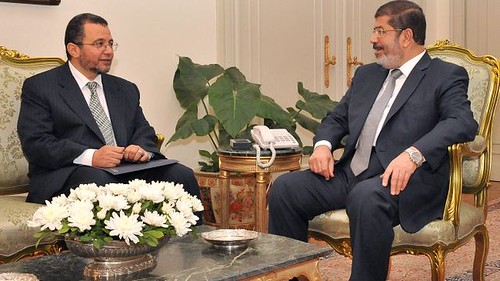
Egyptian Prime Minister Hisham Qandi, left, with President Mohamed Morsi. They are working on appointing a new cabinet in the North African state., a photo by Pan-African News Wire File Photos on Flickr.
New Egyptian Cabinet Has Few Holdovers, Islamists
By Associated Press
August 1, 2012
(CAIRO) — Egypt‘s incoming Cabinet will have few Islamists and some holdovers from the outgoing military-backed team in key positions, according to a partial list released by state media Wednesday, a day before the first government under the country’s new Islamist president is sworn in.
The choices by President Mohammed Morsi’s prime minister, Hesham Kandil, are seen as a test of the intentions of Morsi’s Muslim Brotherhood.
Egypt’s official news media listed more than 20 ministers in the new Cabinet, so far including only two members from the Brotherhood — an apparent attempt to calm concerns over the group’s intention to dominate the government.
The Brotherhood appointees will hold the higher education and the housing ministries.
Highlighting the difficulties of forming a government with broad appeal, Kandil took more than a week to nominate his ministers. The government must also work through a power struggle between the newly elected president and the military council, which ruled Egypt during 17 months of transition.
The military council, headed by Field Marshal Hussein Tantawi, took over power following longtime President Hosni Mubarak’s ouster.
Just before Morsi was declared winner, the military council issued a constitutional amendment which undercut much of the president’s authority, gave the military the right to approve the budget and retain legislative powers. The first elected parliament had been dissolved through a court order days before.
Key ministers of information, justice and culture are yet to be named, highlighting the tough negotiations over the posts. The defense minister is expected to be named by the military.
Kandil and Morsi’s first government face daunting challenges, the first of which is presenting a coalition government that moves to heal deep divisions in the country following the election in June of the Islamist Morsi as Egypt’s first civilian president.
Morsi had promised an inclusive government, but an alliance of pro-democracy advocates criticized him for choosing a prime minister with few known accomplishments, while alienating political groups with liberal leanings.
From the beginning, some liberal parties said they would boycott a government formed under a Brotherhood president.
The new lineup is likely to face criticism from the youth and protest groups that led the uprising against Mubarak, because it includes none of their representatives, and in many cases it promotes mid-level ministry officials from the old regime to the top jobs.
(MORE: The Death of Omar Suleiman: Man of Shadows Slips into the Dark)
According to the partial list, the ministers of finance and foreign affairs from the outgoing transitional military-backed government keep their posts, an apparent attempt to reassure Egypt’s international allies and investors.
The main domestic problems confronting the government are the economy and domestic security.
An economic crisis was caused in part by steep drops in investments and tourism during 18 months of turmoil that started with last year’s uprising that overthrew Mubarak.
Egypt’s foreign currency reserves have dropped to dangerous levels, and attempts to secure foreign loans have not borne fruit because of political infighting.
The new Interior Minister’s main task will be restoring a sense of security to his people, who have suffered from a crime wave and lawlessness.
The minister, Maj. Gen. Ahmed Gamal-Eddin, was the head of public security under the outgoing minister and previously served as a police chief in southern Egypt.
The new government faces also rising public frustration. Hospitals have come under attack by angry Egyptians, and demonstrators have blocked roads in frustration over frequent power outages and a lack of running water. Labor strikes are widespread.
Symbolic of the problems, a boiler in a major power plant in Assiut in southern Egypt exploded Wednesday, shutting down the unit. Also, a plant in another province to the north broke down, plunging the seven governorates that make up the heart of Egypt’s south into darkness, an electricity company official said.
This constitutes a 40 percent loss of power generating capacity in central and southern Egypt, the official said on condition of anonymity because he is not allowed to speak to reporters.
Angry residents went on a rampage, firing guns in the air in one province, and in another, setting tree trunks on fire and putting them on railroad tracks to block traffic.
Morsi is due to visit the area Thursday after swearing in his new Cabinet.
The Cabinet will have two women ministers, including the only Coptic Christian.
The new government will have no representative from the powerful, radical Salafi party, Al-Nour, which backed Morsi in his bid for the presidency. Party spokesman Nader Bakkar said Kandil ignored requests by his party for the communication, local development and business sector ministries, offering instead the environment portfolio.
“We rejected this,” he told The Associated Press. “We were not consulted in the formation of the government, and we won’t participate in the government so as not to bear the responsibility.”
As Egypt’s two leading Islamist movements, the Salafis and the Brotherhood sometimes cooperate but often disagree over policy and religious matters. The Salafis won 25 percent of the seats in the now dissolved parliament, while the Brotherhood garnered nearly 50 percent.
Read more: http://world.time.com/2012/08/01/new-egyptian-cabinet-has-few-holdovers-islamists/#ixzz22MEfKovN
No comments:
Post a Comment